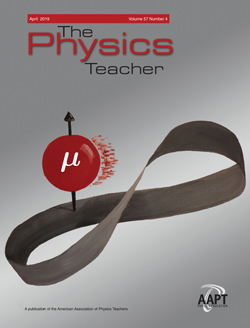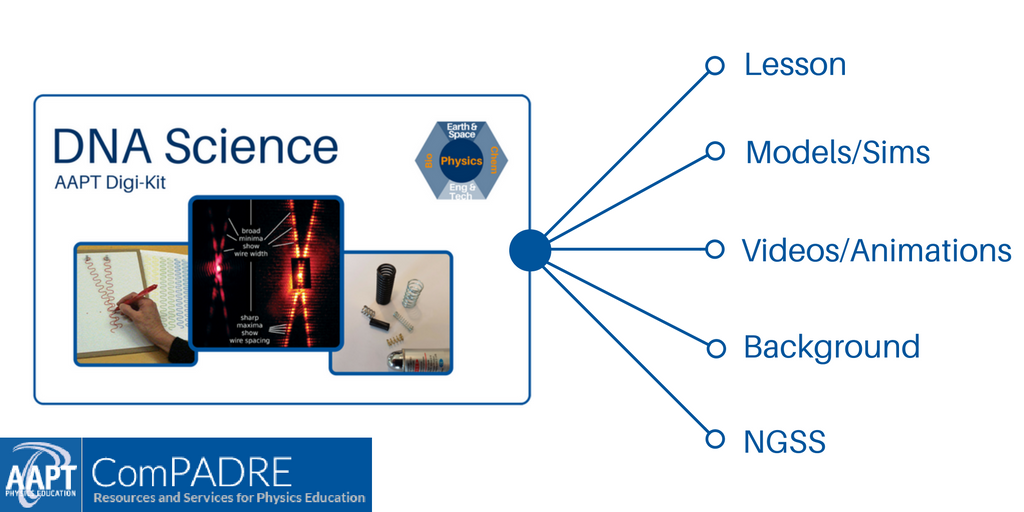The Physics Teacher
Volume 57 Issue 4, April 2019
Spinning Muons and a Path to Discovery
This month's cover portrays a spinning muon on a Mbius band. The mathematics of a Mbius strip is loosely related to the symmetry properties of fundamental fermions such as muons. The article tells about the fascinating and twisty path to uncover the mysteries of muon spin, and its implications for our understanding of the universe.
Letters to the Editor
Comment on “Classroom Simulation of Gravitational Waves from Orbiting Binaries” and a challenge by Robert Hilborn. DOI: The Physics Teacher 57, 211 (2019); https://doi.org/10.1119/1.5095367.
Prior work on using a scanner for teaching physics by Gorazd Planinšic. DOI: 10.1119/1.5095368.
Erratum: Gravitational Wave Detection in the Introductory Lab, Phys. Teach. 55, 288 (2017) by Lior M. Burko. DOI: 10.1119/1.5095369.
Columns
And the Survey Says..., Figuring Physics, iPhysicsLabs, Little Gems, Physics Challenge for Teachers and Students, Fermi Questions, Talkin' Physics, Technology in the Classroom
Papers
Brief Analysis of Sounds Using a Smartphone by Catalin Florea. DOI: 10.1119/1.5095371.
Spinning Muons and a Path to Discovery by Don Lincoln. DOI: 10.1119/1.5095372.
A Scientific Mystery by Thomas B. Greenslade Jr.. DOI: 10.1119/1.5095373.
Learning from a Museum Exhibit: The Case of the 19th-Century Compensation “Gridiron” Pendulum by Efstratios Kapotis, and Chrysoleon Symeonides. DOI: 10.1119/1.5095374.
Adding Student Video Projects to Physics Courses by David Abbott, Andrew Roberts, Dan MacIsaac, Kathleen Falconer, Florian Genz, Stefan Hoffmann, André Bresges, and Jeremias Weber. DOI: 10.1119/1.5095375.
What’s in a Name: Why Do We Call a Bouncy Ball Bouncy? by Kelley D. Sullivan. DOI: 10.1119/1.5095376.
Monkeying Around in Mechanics: Using Student-Student Dialogue Videos to Increase Physics Learning by Vera Margoniner, Jérôme Bürki, and Micaela Kapp. DOI: 10.1119/1.5095377.
The Apollo 1 Fire: A Case Study in the Flammability of Fabrics by Greg DiLisi, and Stella McLean. DOI: 10.1119/1.5095379.
A Proposal for Discussing the Electrical Efficiency Concept by Frederico Alan de Oliveira Cruz, Léo Rodrigues M. dos Santos, and Paulo Simeão Carvalho. DOI: 10.1119/1.5095380.
Applying Thévenin’s Theorem and Kirchhoff’s Junction Rule to a Common RC Circuit by C. E. Davis, J. L. Piffer, M. D. Cohen, and J. P. Polley. DOI: 10.1119/1.5095381.
Determination of Diode Characteristics by Using Arduino by Fatih Önder, Esra Bìlal Önder, and Mehmet Ogur. DOI: 10.1119/1.5095382.
Acceleration, Velocity, and Displacement for Magnetically Damped Oscillations by Peter F. Hinrichsen. DOI: 10.1119/1.5095384.
Thomas Young and the Rosetta Stone by Harry Manos. DOI: 10.1119/1.5095385.
A Quicker Way to Solve Series-Parallel Circuits by Philip Keller. DOI: 10.1119/1.5095387.
Additional Resources
Race and Physics Teaching Collection Resource
DNA Science Lesson & Digi-Kit
Inspired by an article from The Physics Teacher, this multidisciplinary lesson and digital resource collection is based on How Rosalind Franklin Discovered the Helical Structure of DNA: Experiments in Diffraction (Braun, Tierney, & Schmitzer, 2011). Click the image to access this resource.



